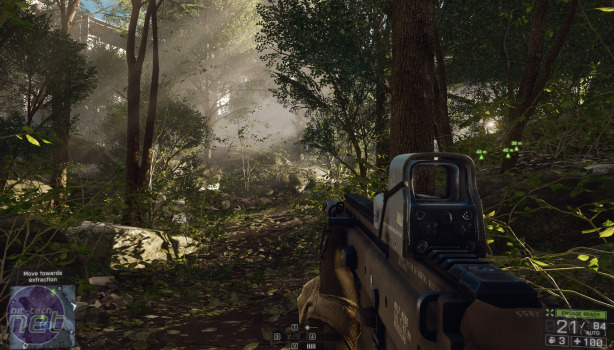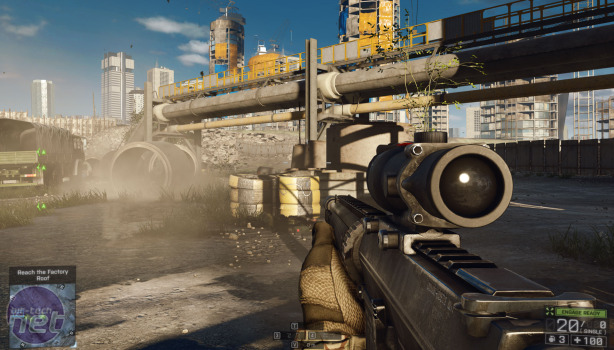The main pattern we've observed is that Battlefield 4 tends to favour AMD's hardware, especially at the higher presets. Pretty much across the board, the red team's cards outperform their Nvidia competition. The differences are more pronounced in terms of minimum framerates, so driver updates could well change the situation, but we can't ignore the fact that AMD's API, Mantle, is also set for release soon and will potentially bring with it even more performance for the AMD cards.
Looking at the best performers, the R9 290 does very well at the higher end, as it's often able to keep pace with and even outclass the GTX Titan. Meanwhile, further down, the R9 270X enjoys excellent performance, somehow managing to keep up with the more powerful GPU in the HD 7950 with Boost. This card also enjoys a considerable advantage over the HD 7870, which leads us to believe that it could be well worth firing up MSI Afterburner or EVGA Precision X to give your card's core and memory frequencies a boost, as this result suggests that BF4 can be quite sensitive to the higher speeds.
The game also has the ability to scale very well in multi-GPU set-ups, as the HD 7990 reveals. AMD again has a slight advantage here, and if you're shopping at the top end the HD 7990 is an excellent deal at £400. It consistently does much better than the R9 290X, GTX 780 Ti and GTX Titan, for example, despite costing less than all of them. We're also keen to see how well a pair of R9 270X cards might do.
The use of MSAA in the game causes a big performance hit, which is why it's only reserved for the ultra preset. As such, disabling it while still using ultra settings everywhere else will give you a very large performance gain, and this was something that was also the case in Battlefield 3. Ambient Occlusion has less of an impact, while the new resolution scale option is a massive resource hog and best left alone until the current crop of hardware significantly improves.
Finally, our brief investigation into the world of CPUs and memory showed their impact to be miniscule compared to that of graphics hardware. Multiplayer modes will likely stress both components more, however, so we'd still be reticent to skimp too much on these if we were seeking out upgrades at the moment.
As with Battlefield 3, then, Battlefield 4 and the Frostbite 3 engine are very much GPU limited, which should make the game an effective benchmark for graphics cards for some time. It also once again scales very well across a whole range of hardware, yet only really begins to look distinctly bad at its absolute lowest settings.
Right, enough testing, time for another round of Zavod 311...
Looking at the best performers, the R9 290 does very well at the higher end, as it's often able to keep pace with and even outclass the GTX Titan. Meanwhile, further down, the R9 270X enjoys excellent performance, somehow managing to keep up with the more powerful GPU in the HD 7950 with Boost. This card also enjoys a considerable advantage over the HD 7870, which leads us to believe that it could be well worth firing up MSI Afterburner or EVGA Precision X to give your card's core and memory frequencies a boost, as this result suggests that BF4 can be quite sensitive to the higher speeds.
The game also has the ability to scale very well in multi-GPU set-ups, as the HD 7990 reveals. AMD again has a slight advantage here, and if you're shopping at the top end the HD 7990 is an excellent deal at £400. It consistently does much better than the R9 290X, GTX 780 Ti and GTX Titan, for example, despite costing less than all of them. We're also keen to see how well a pair of R9 270X cards might do.
The use of MSAA in the game causes a big performance hit, which is why it's only reserved for the ultra preset. As such, disabling it while still using ultra settings everywhere else will give you a very large performance gain, and this was something that was also the case in Battlefield 3. Ambient Occlusion has less of an impact, while the new resolution scale option is a massive resource hog and best left alone until the current crop of hardware significantly improves.
Finally, our brief investigation into the world of CPUs and memory showed their impact to be miniscule compared to that of graphics hardware. Multiplayer modes will likely stress both components more, however, so we'd still be reticent to skimp too much on these if we were seeking out upgrades at the moment.
As with Battlefield 3, then, Battlefield 4 and the Frostbite 3 engine are very much GPU limited, which should make the game an effective benchmark for graphics cards for some time. It also once again scales very well across a whole range of hardware, yet only really begins to look distinctly bad at its absolute lowest settings.
Right, enough testing, time for another round of Zavod 311...

MSI MPG Velox 100R Chassis Review
October 14 2021 | 15:04











Want to comment? Please log in.